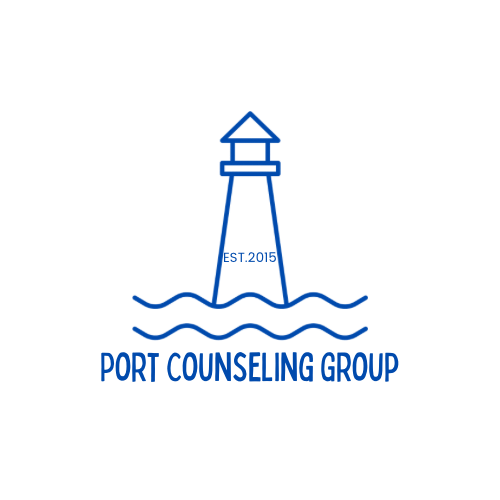Therapy for Postpartum Depression & Anxiety
Baby blues are common and typically occur within the first few days to weeks after childbirth. This transient condition is characterized by mood swings, tearfulness, fatigue, and feelings of overwhelm. Baby blues are considered a normal response to the hormonal shifts and adjustment to the new role of parenthood. Symptoms usually resolve on their own within a couple of weeks.
Postpartum depression (PPD), on the other hand, is a more severe and persistent condition that affects approximately 1 in 7 individuals after childbirth. It involves intense feelings of sadness, hopelessness, guilt, and worthlessness that interfere with daily functioning. Unlike baby blues, postpartum depression may develop gradually and can persist for months if left untreated.
Postpartum anxiety (PPA) often coexists with depression or can manifest independently. It is characterized by excessive worry, racing thoughts, restlessness, irritability, and physical symptoms such as muscle tension or panic attacks. Individuals with postpartum anxiety may have intrusive thoughts about harm coming to their baby or may be excessively vigilant about the baby's safety.

Signs of Postpartum Depression (PPD)
-
Mothers with PPD may experience intense feelings of sadness, emptiness, or hopelessness that persist beyond the typical "baby blues" period, which usually resolves within a few weeks after childbirth.
-
They may lose interest or pleasure in activities they once enjoyed, including caring for their baby, spending time with loved ones, or engaging in hobbies or social outings.
-
PPD can cause overwhelming fatigue or exhaustion, even when mothers have had sufficient rest. They may struggle to muster the energy to perform daily tasks or take care of themselves and their baby.
-
Some mothers may experience changes in appetite, leading to either significant weight loss or gain. They may have little interest in eating or turn to food as a coping mechanism for their emotional distress.
-
PPD often disrupts sleep patterns, making it difficult for mothers to fall asleep, stay asleep, or experience restorative sleep even when the baby is sleeping. Persistent insomnia or hypersomnia can exacerbate feelings of fatigue and irritability.
-
Mothers with PPD may harbor intense feelings of worthlessness, guilt, or self-blame, particularly regarding their perceived inadequacies as mothers or their inability to enjoy motherhood as expected.
-
PPD can impair cognitive functioning, making it challenging for mothers to concentrate, remember information, or make decisions. They may feel mentally foggy or disoriented, contributing to feelings of incompetence or overwhelm.
-
PPD may manifest with physical symptoms such as headaches, stomachaches, or muscle tension, which are often attributed to the stress and emotional strain of motherhood.
-
Mothers with PPD may withdraw from social interactions, avoiding contact with friends, family members, or support groups. They may feel ashamed or embarrassed about their struggles and fear being judged by others.
-
In severe cases, mothers with PPD may experience intrusive thoughts or fantasies about harming themselves or their baby. It's crucial to seek immediate professional help if experiencing such thoughts.
-
PPD can interfere with the mother-infant bonding process, leading to feelings of detachment, ambivalence, or resentment towards the baby. Mothers may struggle to experience joy or affection in their interactions with their child.
Signs of Postpartum Anxiety (PPA)
-
Mothers with PPA may experience persistent, intrusive worries or fears related to their baby's health, safety, or well-being. They may obsessively fret about potential dangers or worst-case scenarios.
-
PPA can cause feelings of restlessness, agitation, or irritability, making it difficult for mothers to relax or unwind. They may feel constantly on edge or have difficulty calming down.
-
PPA often manifests with physical symptoms such as rapid heartbeat, sweating, trembling, or muscle tension. These symptoms may mimic those of a panic attack and contribute to feelings of distress.
-
Mothers with PPA may struggle to fall asleep or stay asleep due to racing thoughts, worry, or physical discomfort. Sleep disturbances can exacerbate anxiety symptoms and impair daily functioning.
-
Some mothers may experience sudden, intense episodes of panic or fear, accompanied by symptoms such as chest pain, shortness of breath, dizziness, or feelings of impending doom.
-
PPA can lead to hypervigilance or excessive monitoring of the baby's well-being, including frequent checking or reassurance-seeking behaviors. Mothers may feel unable to relax or trust others to care for their baby.
-
Similar to PPD, PPA can impair concentration and cognitive function, making it challenging for mothers to focus on tasks or engage in daily activities.
-
In severe cases, mothers with PPA may experience intense fear or discomfort when left alone with their baby, fearing they won't be able to cope or provide adequate care.
Signs of Postpartum Depression and Anxiety in Fathers
Certainly, postpartum depression and anxiety can affect fathers as well as mothers, though they may manifest differently due to various factors. Here's an exploration of how their experience may differ from mothers:
-
Fathers experiencing postpartum depression or anxiety may face greater stigma and societal expectations to "tough it out" or prioritize providing for their family, which can deter them from seeking help or acknowledging their struggles.
-
While mothers may openly express feelings of sadness or tearfulness, fathers may be more likely to internalize their emotions or mask their distress with anger, irritability, or withdrawal.
-
Fathers' experiences of postpartum depression and anxiety may be influenced by their role identity and expectations as providers, protectors, and caregivers. Challenges to their perceived role competence or autonomy may exacerbate feelings of inadequacy or loss of control.
-
Fathers may have limited access to peer support groups or resources specifically tailored to their needs as new parents, which can compound feelings of isolation and alienation.
-
Postpartum depression and anxiety in fathers can strain the couple relationship, affecting communication, intimacy, and shared parenting responsibilities. Couples may struggle to navigate their individual needs and responsibilities amidst the demands of caring for a newborn.
Signs You May Benefit From Therapy for Postpartum Depression/Anxiety
How Therapy at PORT Works
-
Inquire
Use our online contact form and let us know which of our Therapists you would like to work with. We will promptly connect you to your preferred provider for your brief free phone consultation. We want to go the extra mile to make sure you feel comfortable from the start.
-
Get to the Root
Your therapy will likely start out with having sessions either weekly or biweekly. With your Therapist, you will get a better understanding of your presenting concerns and how they came about. Your therapist will also help you assess your level of coping and teach you additional strategies.
-
Do the Work
The bulk of your experience will be in doing the work, both in & out of sessions. You will work through implementing techniques to improve your mood and engagement in relationships in session, while completing tasks assigned by your therapist to further your progress.
-
Have Better Relationships
This is the point where you get to be #RelationshipGoals. You are having fewer therapy sessions and experiencing emotional healing from past relationship trauma. You are in a place where you are feeling more competent to handle whatever comes next.







